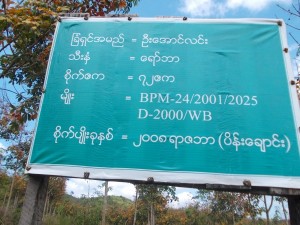Land confiscation of property belonging to villagers by developers and government officials in Tenasserim Division has become a complicated issue for the Karen National Union (KNU) during its peace-building process with the Burma government.
 Ber Baw Lor, a Karen village in southern Burma, is an example where the entire population was displaced, and its residents now living in a makeshift camp provided by a Non-Government-Organization (NGO). The entire village was taken over by a rubber plantation.
Ber Baw Lor, a Karen village in southern Burma, is an example where the entire population was displaced, and its residents now living in a makeshift camp provided by a Non-Government-Organization (NGO). The entire village was taken over by a rubber plantation.
Saw Aye Aye, a Ber Baw Lor villager, spoke to Karen News about the displacement.
“The rubber plantation owner, we knew as U Aung Linn. He came into our village [Ber Baw Lor] in November 2004. We showed him our land grant but the manger told us it was not officially recognized. He threw away our land grant and we could not do anything. The company plantation is over 500 acres. It took over all our village and surrounding land, including the land that we make our living from.”
Saw Aye Aye, and his family of four families, had about 10 acres of land that was taken from them. Saw Aye Aye family had to leave their home without any compensation being paid for their loss. Now the family has nothing left. They are now living in a small wooden house provided by a NGO in a neighboring village, Ya Ta Pa.
Ber Baw Lor was a Karen village of about 50 households before its forced eviction of is residents. After the plantation owner took over the village, Saw Aye Aye and all other villagers moved to Ta Ka Klo in 2005. The plantation owner expanded his project to areas covering the villagers’ new settlement area and once again forced Saw Aye Aye and other villagers to leave.
Saw Aye Aye explained the situation to Karen News.
“In 2010, he [the rubber plantation owner] forced us to moved out [from Ta Ka Klo]. When we refused to move he then started to cut down our plantations and burnt our houses. He threatened us if we refuse to move he would ask Burma Army to come and move us out. He also threatened us that he would put all our villagers in jail. So we had to move.
Saw Aye Aye said that in the process of been forced out of the village, two houses were burnt down.
“All Ber Baw Lor villagers faced problems. We moved to Ya Ta Pa village, but we didn’t have land to make our living off. Now we have to live in small houses that were constructed by foreigners (NGO’s). The houses are small, just eight square feet. All of us have to live like that.”
Saw Aye Aye said, to survive he has to work for the rubber plantation owner, the man who ruined him and many of his friend’s livelihoods.
“We got 2,500 Kyat (2.8 US$) for a day’s work, but sometimes the rubber plantation owner didn’t pay us he claimed we did not do our work. We complained to the KNU many times without getting any help to resolve the issue. I just want my village back.”
Saw Lah Wah, from Ber Baw Lor village who now lives in Ya Ta village after being displaced said.
“We don’t have land for rice farming, no garden or land. Now the only choice for us is to work on the rubber plantation owners land. Even we return to our village we have to get travel papers and the area is now
fenced. The rubber plantation owner threatens us if anything happen to his rubber. We want the KNU to help us to get back our land. We are now living in Ya Ta Pa. We earn our living as daily labors, we don’t earn enough, we cannot raise chickens, pig sand sometimes our families starve.”
P’doh Saw Eh Kaw, the KNU’s Ler Mu Lah Township chairman spoke to Karen News.
“There are huge and widespread contract farming projects that grab land belonging to villagers. The business people work with local military leaders and grab villagers’ lands. In our township, especially in Ta Poe, Ma Zaw and Ka Pyaw are the most land disputes.The KNU intends to resolve land disputes and we are now collecting facts about land disputes.”
P’doh Saw Paw Day Htoo, the KNU Ler Mu Lah Township officer in charge of Ta Po and Ma Zaw area told Karen News.
“Today the common problem is that villagers are facing more and more company and business people forcibly taking their land. Villagers land at Tu Pyauk, Ta Ka, and Nga Ya Aye were taken. In the Ta Po and other areas, villagers were made to abandon (by Burma Army) their lands that were then taken by Asia World, Malaysia company MSPP (Myanmar Stark Prestige Plantation) and other plantation projects took the land belonging to villagers. The land was once owned by Karen villagers, before they were forced to flee a Burma Army offensive.”



